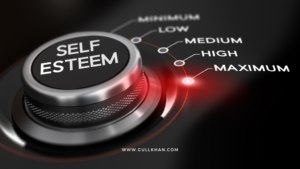In a world where the measure of a person often comes down to their achievements and external validation, it’s easy to confuse self-worth with self-esteem. Both concepts, while interconnected, hold distinct places in our understanding of ourselves and our place in the world. Today, let’s embark on a journey to demystify these concepts and unearth the true path to abundance.
The Parable of the Golden Buddha
 Centuries ago, a village in Southeast Asia was home to a magnificent golden Buddha. This statue wasn’t just a religious icon; it was the heart of the community. However, as war approached, the villagers, fearing the worst, cloaked their treasured Buddha in clay to disguise its value.
Centuries ago, a village in Southeast Asia was home to a magnificent golden Buddha. This statue wasn’t just a religious icon; it was the heart of the community. However, as war approached, the villagers, fearing the worst, cloaked their treasured Buddha in clay to disguise its value.
The inevitable happened—the village was ravaged, and knowledge of the golden Buddha was lost. It wasn’t until the mid-20th century that, during the relocation of a monastery, a glimmer of gold was spotted beneath the clay. As layers were removed, the true splendor of the Buddha was revealed once more, now housed in its own temple, a testament to its enduring worth.
The golden Buddha is not just a sacred relic but a symbol of resilience and the eternal worth that lies within. It serves as a poignant reminder that true value can never be diminished by the sands of time or the trials of life, and that sometimes, the most extraordinary treasures are hidden in plain sight, waiting for the moment when they can shine once again.
Self-Worth vs. Self-Esteem
The parable of the golden Buddha not only embodies the enduring saga of human civilization but also serves as an allegorical canvas upon which the intricate nuances of self-worth and self-esteem are vividly painted.
Just as the golden Buddha’s intrinsic value remained unscathed beneath layers of clay, our inherent self-worth is a constant, an unchanging core that exists independent of the vicissitudes of life and the judgments of the world.

Self-worth is akin to the quiet pulse of a hidden spring, a source that nourishes from within. It is the bedrock of our being, the unshakeable belief in our own significance, and the recognition of our innate human dignity.
This intrinsic value does not fluctuate with the seasons of our lives or the fortunes of our endeavors. It is as present in the infant’s first breath as it is in the sage’s last—it is an immutable truth of our existence.
Contrast this with self-esteem, which, much like the clay encasing the golden Buddha, is an external construct. It is the patina acquired through our interactions with the world, shaped and reshaped by the accolades we earn, the goals we achieve, and the recognition we garner. Self-esteem is the mirror held up by society, reflecting back at us an image that can either amplify our brightness or cast shadows of doubt.
Indeed, self-esteem is a mercurial companion, buoying us with a sense of pride in our moments of triumph, yet just as swiftly plunging us into the depths of despair when failure casts its gloomy pall. It is a measure not of who we are, but of how we are perceived, a gauge that varies with the perspectives and prejudices of those around us.
The Price of Misaligned Esteem
The repercussions of prioritizing external validation over internal worth are profound and far-reaching. Dr. Jennifer Crocker’s research provides a compelling glimpse into this dynamic. Her studies reveal that students who tethered their self-worth to external validation—like grades, appearance, or social approval—were more prone to stress, anger, and an array of detrimental behaviors. This relentless quest for approval led them down a path fraught with emotional turbulence and instability.
Conversely, students who cultivated a self-worth that was deeply rooted in an unshakeable belief in their intrinsic value exhibited remarkable academic and personal growth. Their well-being was not contingent on external accolades or achievements. Instead, it sprang from a steady and secure inner foundation.
These striking differences underscore the profound impact our internal beliefs exert on our external realities. When our esteem is misaligned—anchored in the shifting sands of external validation—we find ourselves on an unsteady, often treacherous terrain.
However, when our sense of worth is aligned with a deep and unwavering belief in our inherent value, we navigate life with greater stability, resilience, and fulfillment. It is this inner alignment that shapes our experiences, relationships, and ultimately, our destiny.
From Self-Worth to Abundance
 Embarking on the journey to abundance is fundamentally a process of inward reflection and self-appreciation. It begins with a profound acknowledgment of our inherent self-worth. This is not about vanity or arrogance but recognizing that we, as individuals, possess an intrinsic value independent of external accolades or successes.
Embarking on the journey to abundance is fundamentally a process of inward reflection and self-appreciation. It begins with a profound acknowledgment of our inherent self-worth. This is not about vanity or arrogance but recognizing that we, as individuals, possess an intrinsic value independent of external accolades or successes.
When we learn to value ourselves in this unconditioned manner, we naturally establish healthy boundaries, attract authentic opportunities, and navigate the complexities of life with greater resilience and grace.
In stark contrast, a deficiency in self-worth distorts our perception and our belief in what we rightfully deserve, constricting our access to the richness and fullness of life. It is akin to a magnificent statue of Buddha veiled in layers of clay—our true potential remains shrouded, eagerly awaiting our recognition and honor of our innate worth.
Cultivating Self-Worth
The elevation of self-worth is less about altering our external circumstances and more about an internal awakening. It begins with the subtle yet powerful practice of affirmations—positive, reinforcing statements that act as gentle yet persistent reminders of our inherent value. These affirmations are like seeds planted in the fertile soil of our consciousness, gradually taking root and bolstering our confidence and self-esteem.
Incorporating gratitude practices into our daily routine also plays a pivotal role in this transformation. By consciously shifting our focus from perceived deficiencies to an appreciation of the abundance that already exists in our lives, we raise our vibrational energy, enhancing our resilience and our ability to attract more positivity.
Equally important is learning the art of receiving gracefully. This is not merely about accepting gifts or compliments but encompasses a deeper dimension of trust, openness, and acknowledging our innate worthiness to receive the abundant gifts that life has to offer.
And perhaps most crucially, we must cease the harmful practice of negotiating our worth with others. Our right to desire and pursue a fulfilling life is inherent and non-negotiable. By steadfastly recognizing and honoring our worth, we take the first, most vital step towards unlocking our full potential and paving the way to a life of abundance.
Conclusion
 When we align with our true self-worth, life unfolds with ease and serenity. This alignment is the essence of the journey from self-worth to abundance—a path not of seeking external validation, but of recognizing the golden radiance that has always resided within.
When we align with our true self-worth, life unfolds with ease and serenity. This alignment is the essence of the journey from self-worth to abundance—a path not of seeking external validation, but of recognizing the golden radiance that has always resided within.
For a deeper dive into cultivating a mindset of abundance, visit https://www.millionairefoundations.com/ and discover the potential waiting to be uncovered within you.
